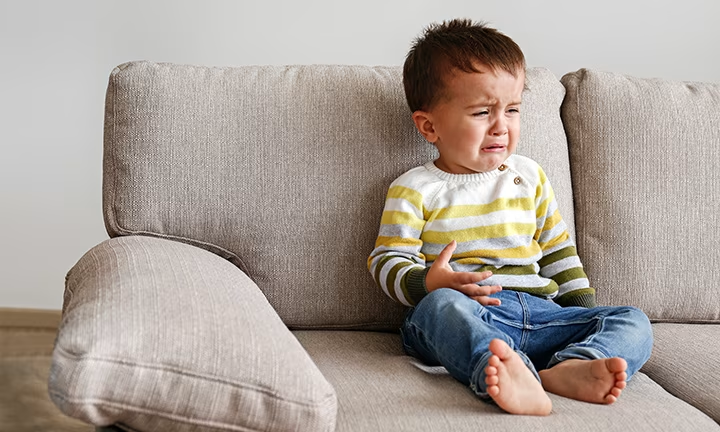
Stomach Pain in Children: Toddler Tummy Aches
Although tummy aches are a common complaint in children – the reason for five to 10 per cent of all visits to a doctor or emergency facility – they seldom turn out to be a cause for serious concern. Most of the time, tummy pains are caused by a viral infection and disappear in a couple of days. However, if your child complains of stomach pain every day, it may be a sign of something more serious. Check out the following common causes for stomach pain in children to find out when to take a visit to your child’s GP.
Look for the Signs
Every child will experience a tummy ache from time to time. They’re a completely normal part of toddler life. There are some signs, however, that you should bring to your healthcare provider's attention to help work things out. Oddly enough, severity of pain is not necessarily the most important issue. Gas trapped in a loop of bowel may cause sudden, inconsolable screaming in a child who writhes on the floor but has no fever, does not vomit and recovers by relaxing in a warm bath. Worrisome signs that may be more serious problems:
If your child has any of the symptoms above you should bring them to your healthcare provider's attention immediately.
You can also try to determine whether the pain is generalised, localised or cramp-like. Generalised pain is common in cases of indigestion, gas, constipation, or a stomach virus. Whereas localised pain may occur if there are issues with your child’s appendix, gallbladder, ovaries, and testicles, or indicate a hernia or stomach ulcer. On the other hand, cramp-like pain is commonly caused by gas and is commonly followed by diarrhoea.
Other signs that your child is experiencing stomach pain can include fussiness, loss of appetite and drawing their legs up towards their belly.
Possible Causes of Tummy Pain in Children
As previously mentioned, tummy pain is entirely normal in children and usually nothing to worry about. To put your mind at east, read the following overview of the most common causes of tummy pain in toddlers with tips to help you know when it may be something serious and requires medical attention.
Constipation
Constipation is one of the most common reasons behind tummy aches in children. When constipated, toddlers may have infrequent bowel movements or hard, dry stools. If this happens on a regular basis or when potty training, it may indicate that your child’s diet needs adjusting.
It’s important to make sure your child is getting enough fibre in their diet and drinking enough fluids to keep things moving. Be sure to give your child plenty of fruits and vegetables along with whole grain foods and lots of liquids.
If your child starts potty training too early or feels under pressure during the process, they may rebel and hold their bowel movements. Or, your child may end up feeling nervous about the toilet, especially in public toilets, and withhold going.
Over time with your encouragement, your little one will start to enjoy a variety of fibre-rich foods and get the hang of using the toilet. Constipation may also result from other factors:
If your toddler is constipated for more than two weeks, or if they complain about pain on a daily basis, have blood in their stool, have a fever and/or loss of appetite, you should contact your child’s GP to get to the bottom of the issue.
Food Allergies and Intolerances
Just like adults, children can also experience tummy upsets as a result of food allergies, intolerances and sensitivities. Foods most likely to trigger an allergic reaction in children are:
If your little one experiences allergies, intolerances or sensitivities to certain foods, they may experience tummy pain, including gas, bloating, indigestion and diarrhoea .
Keep in mind that there is a difference between food intolerances or sensitivities and food allergies. The former won’t trigger an immune response but may still give your little one an upset tummy. On the other hand, allergic reactions may produce other symptoms accompanying a tummy ache. These include sneezing, a runny or blocked nose, red, itchy and watery eyes, wheezing and coughing, a red, itchy rash and exacerbated eczema or asthma symptoms.
Speak to your child’s GP if you have any concerns about food allergies or if your toddler keeps experiencing tummy pain after eating certain foods. If your child shows any serious symptoms of a food allergy, like swelling, trouble breathing or loss of consciousness, call 999 or go to A&E right away!
Stomach Flu or Food Poisoning
One reason your child may have an upset tummy is ‘stomach flu’, i.e. viral gastroenteritis. Stomach flu usually causes diarrhoea and may lead to vomiting. Food poisoning symptoms are typically the same. Fortunately, symptoms usually cease after 48 hours and your little one should be back on their feet as soon as possible. Vomiting may last 24 hours or more if your child has stomach flu but should end within 12 hours if food poisoning is to blame. Contact your child’s GP if symptoms don’t let up or if your toddler has bloody stool, a pounding heartbeat, or diarrhoea accompanied by a high fever. As these symptoms can cause dehydration, it’s important to make sure your child gets enough fluids.
Tonsillitis or Glandular Fever
It may surprise you to learn that tonsillitis can sometimes occur not with throat pain, but with a fever and tummy pain. Sometimes a child thought to have appendicitis has actually been diagnosed with tonsillitis instead.
In the case of glandular fever, your child will probably exhibit similar symptoms to tonsillitis, including an upset tummy. The pain from glandular fever is typically localised, so ask your toddler where it hurts. If your child points to the left side of their abdomen, this could be the result of a swollen liver or spleen induced by glandular fever.
While glandular fever can be highly unpleasant for your little one, most of the symptoms should pass within 2 weeks. Lots of rest and fluids are key. If you have reason to suspect your child may have glandular fever, it’s best to get in touch with their GP. They may recommend limiting activity and play until your child’s tummy ache subsides.
Stress and Anxiety
Sometimes, tummy aches and pains can be triggered by stress and anxiety. This can happen to both adults and children. If your child is battling tummy pain yet doesn’t exhibit any other symptoms like cramping, diarrhoea, vomiting, or other signs of infection, it may be worth taking a look at what is going on in their life. Your little one may experience stress when
Often, it can be helpful to sit down and talk to your child. Ask them what’s on their mind, perhaps using a toy or acting out feelings with a game. Your GP may suggest a number of ways you can reduce and manage stress, including dietary changes, getting more sleep, increasing the amount of time playing and doing physical activity, and doing more fun things as a family.
Appendicitis
Luckily, appendicitis is a very rare phenomenon in children under 3 years and rarely occurs in children under 5 years. That being said, it’s always good to be aware of the symptoms. If your child has a mild fever and tummy pain, these may be the first signs of appendicitis. It may seem like a minor tummy ache at first, but over time appendicitis can result in worsening pain in the lower right side of the body.
If your child experiences tummy pain that’s getting increasingly worse, contact a GP or your local out-of-hours service immediately. If the pain eases then gets worse, this may be a sign your little one’s appendix has burst, which can lead to life-threatening conditions. Call 999 right away in this case to get an ambulance.
Henoch-Schonlein Purpura
Abdominal pain accompanied by a rash on the buttocks and/or legs that resembles bruising can be caused by a condition called Henoch-Schonlein Purpura. You may never have heard of it, but it is surprisingly common. Nobody knows for sure what causes this condition, but it seems to be related to a bacterial or viral infection. Inflammation of the small blood vessels can lead to bleeding in the skin as well as the bowel and kidneys. While it's not life threatening, your GP will want to watch your child carefully over the course of a few days.
Home Remedies for Tummy Pain in Children
While some reasons behind your toddler’s upset tummy may result in a call to their GP, there are a number of things you can do for less serious symptoms from the comfort of your own home. Your GP may advise the following strategies and home remedies for tummy pain:
When to Contact Your Child’s GP
We have already addressed some instances when you should contact your child’s GP or call 999. However, there are many other reasons children may experience tummy pain, and there a number of various signs and symptoms, some of which require more urgent action than others. Call 999 or go to A&E if your child has a tummy ache and
Other signs may instead require a trip and regular consultation with your child’s GP, these include
FAQs at a Glance
Most of the time, the tummy pain your child is experience is normal and not a cause for concern. However, there are some symptoms that should prompt you to seek emergency medical attention. They include
- severe or sharp stomach pain
- trouble breathing
- blood in the stool or vomit
- dark, tar-like stool
- vomiting but no bowel movements.
The Bottom Line
Most children experience tummy aches from time to time, and they are usually nothing to worry about. The most common reason for tummy pain is constipation. In fact, it’s a standard source of tummy aches in kids of all ages, and rarely cause for concern. You can help alleviate constipation by giving your little on plenty of fluids, keeping them active and making sure their diet is full of fibre-rich foods. However, there are other reasons why your little one’s tummy may be a little upset. Sometimes the stomach flu, stress or even tonsillitis may be to blame. Check in with your child’s GP if the tummy pain persists or gets worse, or if your child exhibits any of the more serious symptoms listed above. Tummy aches and stomach pain may be inconvenient, but with plenty of rest and fluids, they’ll soon be over. Check out of articles on toddler development to find out more about what you can expect as your toddler grows and develops.
The information in this article is based on the expert advice found in trusted medical and government sources, such as the National Health Service (NHS).The content on this page should not replace professional medical advice. Always consult medical professionals for full diagnosis and treatment.
Read more about Toddler
Related Articles
Join Pampers Club and get:











